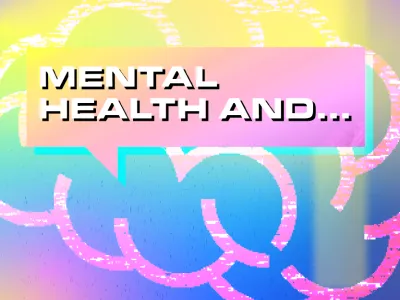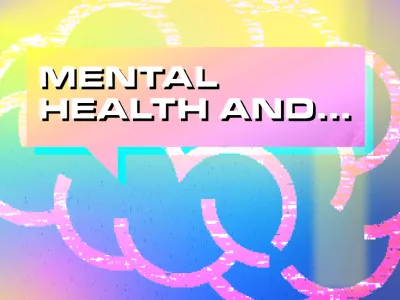
Mental Health And Nature
Include this article in your Skills Builder Journal. It could help you develop... 

It’s Mental Health Awareness Week and over the next few days, we’re bringing you a small series of blogs looking at mental health in connection to different topics. We’ll be hearing from experts who will share their knowledge. In this first instalment, the Mental Health Foundation share why nature is so important and what you can do to better your mental health in the great outdoors. Here’s what they had to say…
We all have mental health, and we can all do more to learn how to look after it. Something as simple as getting into nature has been shown to improve mental health, so this month the Mental Health Foundation are encouraging you to do just that.
Nature is this year’s theme for Mental Health Awareness Week - in this past year, as we have lived through a pandemic, getting outside and into nature has been essential for many of us in looking after our mental health. Many of us are appreciating nature more than ever, and really seeing the benefits it has on our wellbeing.
During Mental Health Awareness Week, we are asking you to do three things:
Experience nature: take time to recognise and grow your connection with nature during the week. Take a moment to notice and celebrate nature in your daily life. You might be surprised by what you notice!
Share nature: Take a photo, video or sound recording and share the connections you’ve made during the week, to inspire others. Join the discussion on how you’re connecting with nature by using the hashtags #ConnectWithNature #MentalHealthAwarenessWeek
Talk about nature: use our tips, school packs, resources, and research to discuss in your family, school, workplace and community how you can help encourage people to find new ways to connect with nature in your local environment.
Here are our top tips for connecting with nature to improve your mental health:

Find nature wherever you are
Nature is all around us. It might be a garden, a local park, a nearby beach or open countryside. Even in cities where nature can be harder to find, there are things like community gardens or courtyards to discover and explore. Look out for the unexpected – an urban fox, changes in the weather or birdsong outside your window. Try to notice nature wherever you are, in whatever way is meaningful for you and use our nature journal to jot it all down!
Connect with nature using all of your senses
Taking some quiet time to reflect in natural surroundings, using all your senses, can be a real boost to your mental health. Whether you’re relaxing in the garden or on your way to school, try listening out for birdsong, looking for bees and butterflies or noticing the movement of the clouds. All of these good things in nature can help you to find a sense of calm and joy.
Get out into nature
If you can, try to spend time visiting natural places - green spaces like parks, gardens or forests – or blue spaces like the beach, rivers and wetlands. This can help you reduce your risk of mental health problems, lift your mood and help you feel better about things. If it feels daunting to get outside, try going with a friend or relative, or picking somewhere familiar.

Bring nature to you
Sometimes it’s hard to access natural places because of where you live, how busy you are, how safe you feel, or your health. Why not try bringing nature into your home? Having plants in the house is a great way to have something natural to see, touch and smell – pots of herbs from the supermarket are a good start.
If you have a garden, allotment or balcony, think about how you can make the most of it. Grow flowers, plants or vegetables, get a bird feeder and take in the sights and sounds around you.
If planting isn’t your thing, you can also connect to nature through stories, art and sound recordings. Watching films or TV programmes about nature are also great ways to connect with and reflect on nature.
Exercise in nature
If you're physically able to exercise, try to do it outside – whether it’s a run, cycle or a short walk. Walking or running outdoors in nature may help to prevent or reduce feelings of anger, tiredness and sadness. Try leaving the headphones at home – unless you’re listening to nature sounds, of course! Or why not try new routes that bring you closer to green spaces or water? You can even sign up to take part in our challenge to get active in nature for 30 minutes every day this month.
Combine nature with creativity
Try combining creativity with your natural environment. This could involve taking part in creative activities outside, like dance, music or art. All of these things can help reduce stress and improve your mood. You could also increase your sense of connection by taking photos, writing, drawing or painting pictures of the landscape, plants or animals. Noticing the beauty of nature and expressing this creatively can help you find meaning and an emotional connection to nature that will stay with you for a lifetime.
Protect nature
Taking care of something can be a really great way to feel good. And what better thing to take care of than nature? Nature is truly amazing – do what you can to look after it in your actions and choices. This can be as simple as recycling, to walking instead of driving, or even joining community conservation or clean-up groups. Taking care of nature can help you feel that you're doing your part, and that can make you feel more positive all round.
These are just a handful of ways you can connect with nature. You can also download our free Thriving with Nature guide – created in partnership with WWF-UK – for even more tips and activities to enjoy nature every season of the year!



